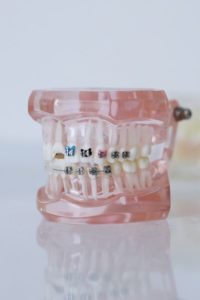7 Common Problems with Braces
April 28, 2023
 If your child is about to begin their orthodontic journey with braces, you can expect an adjustment period. While your little one gets used to having braces, they can run into a few problems along the way. Don’t worry, there’s nothing major you should be worried about. Here’s how to manage 7 common problems with braces.
If your child is about to begin their orthodontic journey with braces, you can expect an adjustment period. While your little one gets used to having braces, they can run into a few problems along the way. Don’t worry, there’s nothing major you should be worried about. Here’s how to manage 7 common problems with braces.
1. Tooth Sensitivity or Tenderness
Braces work by applying continuous pressure on their teeth to move them into alignment. Unfortunately, this can cause some sensitivity and tenderness, especially when first getting their braces or after an adjustment. An over-the-counter pain reliever can reduce their discomfort. Encourage soft foods if they have any tenderness.
2. Irritation to the Insides of the Cheeks
Brackets can rub on the insides of your child’s lips or cheeks, which can cause sores and inflammation. Over time, calluses will form and it won’t be an issue any longer. In the meantime, apply dental wax over the bothersome brackets to reduce friction on the soft tissues.
3. Chapped Lips
Your child’s lips may rest in different positions after getting their braces, which can make them chapped. Lip balm will help prevent cracking and peeling. Ensure your little one is drinking plenty of water to stay hydrated.
4. Sores on the Tongue
Their tongue can get scratched or scraped on the brackets or wires as they learn to eat with their braces on. Wax can cover sharp edges. Encourage them to cut their food into small pieces and chew slowly. Rinsing their mouth with salt water will help reduce pain and inflammation while also killing any bacteria.
5. Broken Archwire
An archwire can break, which can stab into the gums, tongue, cheeks, or other soft tissues. It’s best to call their orthodontist right away for an appointment. If they aren’t open, use small scissors or nail clippers to snip the end off. Applying dental wax can also prevent the wire from causing injuries.
6. Loose Bracket
A bracket can pop off over time. Never use glue or other adhesives to put it back in place. Call their orthodontist for an appointment to have it repaired. Your child can avoid damaging their braces by avoiding hard, crunchy, or sticky foods.
7. Cavities and Gum Disease
Your child can have an increase of cavities and gum disease if they don’t improve their oral hygiene while wearing braces. Although it can be difficult to clean around them, it’s important that your child brushes their teeth after every meal and flosses at least once a day.
If anything concerning happens, don’t hesitate to contact your child’s orthodontist. They’ll provide you with the information you need to make your child’s time with braces as comfortable and stress-free as possible.
About Dr. Reema Dhingra
Dr. Dhingra earned her dental degree from the Tufts School of Dental Medicine and achieved her orthodontic certification from the Tufts School of Orthodontics. She is a member of many professional organizations, including the American Association of Orthodontists and the American Dental Association. Request an appointment through our website or call (508) 859-4263.
No Comments
No comments yet.
RSS feed for comments on this post.
Sorry, the comment form is closed at this time.


